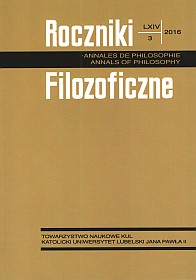Uniqueness of Man in Nature and Some Examples of Its Questioning
Abstract
There are often mentioned specific features of human consciousness and culture: metaphysical reflection, ability of self-consciousness, moral sensitivity, aesthetical and religious experience. One can express the role of the similar contents, stressing the role of modern sciences in the human development or the worth of altruism in the acts of man, who—existing for others—transcends the biological struggle for existence revealing in such a way the rich world of culture that gives right to assert his unique role in the nature. On the other hand, man still remains the element of nature, by the corporeality subordinated to its physical and biological rules. Taking this fact into account, we are not permitted to speak about the absolute transcendence of man over nature but only about relative one. The latter consists in the biological bond of man with the rest of nature and his cultural openness toward supernatural values.
There is also methodologically accepted confirmation for the thesis concerning the coexistence of physical continuity with ontological discontinuity in the evolutionary interpretation of nature. The ontological thesis surely can’t be definitively justified. Therefore, the opposite thesis will be also able to enlist new sympathisers. On the one hand, they would come from the groups that don’t acknowledge the difference between ontological and scientific form of evolutionism; on the other, they would occur among the thinkers capable of the future formulation of a new version of monism making the contemporary opposition between materialism and spiritualism totally pointless.
Apart from above mentioned aspects of the debate, the statement emphasizing that man transcends nature is still being criticized by some intellectual circles depending on methodological presuppositions or ontological declarations. Nevertheless, the basic problem of these explanations consists in the lack of an interpretation of features of the human psyche, adequate to the actual data, that express the relative autonomy of the contents of the human psyche in reference to biological determinants.
References
Barash, David P. Sociobiology and Behavior. New York: Elsevier, 1977.
Chmurzyński, Jerzy Andrzej. “Prawda i fałsz z perspektywy biologicznej” (Materiały z konferencji Tradycyjne i współczesne systemy wartości. Przeciwieństwo drugie: ‘Prawda i Fałsz’ (Staszów 8-10.XII.2000)). The Peculiarity of Man 6 (2001): 403–404.
Darowski, Roman. Filozofia człowieka (Zarys problematyki. Antologia tekstów). Kraków: Wydawnictwo WAM, 2002.
Dobzhansky, Theodosius. “Evolution of Mankind.” In Evolution, edited by Th. Dobzhansky, F.J. Ayala, G. Stebbins, and J. Valentine. San Francisco: W.H. Freeman & Company, 1977).
Heller, Michał, and Józef Życiński. Dylematy ewolucji. Tarnów: Biblos, 1996.
Hoffman, Antoni “Socjobiologiczne uzurpacje,” Znak 32 (1980), 10 (316): 1303–1316.
Jongen, Marc. “Der Mensch ist sein eigenes Experiment. Nach dem Humanismus: Einige Thesen, mit denen der Nationale Ethikrat für Gentechnologie Frieden schließen sollte.” Die Zeit nr 33 (9.08.2001): 31.
Kniffin, Kevin M., and David Sloan Wilson. “Altruism from an Evolutionary Perspective.” In Research on Altruism & Love: An Annotated Bibliography of Major Studies in Psychology, Sociology, Evolutionary Biology, and Theology, edited by Stephen G. Post, Byron Johnson, Jeffrey P. Schloss, Michael E. McCullough, 117–136. Philadelphia, London: Templeton Foundation Press, 2003.
Kunicki-Goldfinger, Władysław. Znikąd donikąd. Warszawa: Państwowy Instytut Wydawniczy, 1993.
Leach, Edmund R. “Biology and Social Science: Wedding or Rape?” Nature 291 (1981): 267–268.
Lumsden, Charles J., and Edward O. Wilson, Genes, Mind, and Culture: The Coevolutionary Process. Cambridge: Harvard University Press, 1981.
Lumsden, Charles J., and Ann C. Gushurst. “Gene-Culture Coevolution: Humankind in the Making.” In Sociobiology and Epistemology, edited by James H. Fetzer, 3–28. Dordrecht: Reidel, 1985.
Popper, Karl R. Objective Knowledge: An Evolutionary Approach. Oxford: Oxford University Press, 1972.
Ruse, Michel. Taking Darwin Seriously. A Naturalistic Approach to Philosophy. Oxford: Blackwell, 1986.
Ruse, Michel. Can a Darwinian be a Christian? The Relationship between Science and Religion. Cambridge: Cambridge University Press, 2001.
Scola, Angelo. “Człowiek: zanikający podmiot czy nowe centrum?” Społeczeństwo 13 (2003), 2(54): 175–194.
Scott, John Paul. The Evolution of Social Systems. London: Harwood Academic Publishers, 1989.
Singer, Peter. Practical Ethics. Cambridge: Cambridge University Press, 1993.
Singer, Peter. Ripensare la vita. La vecchia morale non serve più, trans. S. Rini. Milano: Il Saggiatore, 1996.
Singer, Peter. “All Animals are Equal.” In Unsanctifying Human Life: Essays on Ethics, edited by Helga Kuhse, 80–94. Oxford: Blackwell, 2002.
Szacka, Barbara. “Słowo wstępne.” In Edward O. Wilson. O naturze ludzkiej, trans. Barbara Szacka. Warszawa: Państwowy Instytut Wydawniczy, 1988.
Trivers, Robert L. “The Evolution of Reciprocal Altruism.” Quarterly Review of Biology 46 (1971): 35–57.
Viola, Francesco. Dalla natura ai diritti. I luoghi dell’etica contemporanea. Roma, Bari: Laterza, 1997.
William Wildes, Kevin. Moral Acquaintances: Methodology in Bioethics. Notre Dame: University of Notre Dame Press, 2000.
Wilson, Edward O. The Insect Societies. Cambridge: Harvard University Press, 1971.
Wilson, Edward O. Sociobiology: The New Synthesis. Cambridge: Harvard University Press, 1975.
Wilson, Edward O. “Introduction: What is Sociobiology?” In Sociobiology and Human Nature: An Interdisciplinary Critique and Defense, edited by Michael S. Gregory, Anita Silvers, and Diane Sutch, 1–12. San Francisco: Jossey-Bass, 1978.
Wilson, Edward O. On Human Nature. Cambridge: Harvard University Press, 1978.
Wilson, Edward O., and Charles J. Lumsden. Promethean Fire: Reflections on the Origin of Mind. Cambridge: Harvard University Press, 1983.
Wójcik, Bogusław. “Bioetyka praktyczna Petera Singera.” In System bioetyki, edited by Tadeusz Biesaga, 71–92. Kraków: Wydawnictwo Naukowe PAT, 2003.
Życiński, Józef. Bóg i ewolucja. Podstawowe zagadnienia ewolucjonizmu chrześcijańskiego. Lublin: TN KUL, 2002.
Życiński, Józef “L’evoluzionismo secondo il pensiero di Giovanni Paolo II,” Euntes Docete 56 (2003), 1: 64.
Copyright (c) 2016 Roczniki Filozoficzne

This work is licensed under a Creative Commons Attribution-NonCommercial-NoDerivatives 4.0 International License.





